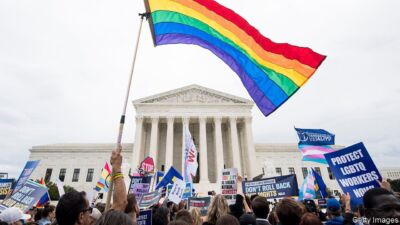
In a landmark decision, the
U.S. Supreme Court ruled yesterday that
Title VII of the Civil Rights Act of 1964 prohibits employers from discriminating against employees for being homosexual or transgender. Prior to yesterday’s ruling, which was issued in
Bostock v. Clayton County, federal courts were split on the question of whether
Title VII’s prohibition against discrimination based on sex was broad enough to encompass discrimination based on sexual orientation or gender identity. The Supreme Court confirmed that when an employer fires an employee for being homosexual or transgender, it necessarily and intentionally discriminates against that individual in part because of sex and is therefore in violation of
Title VII.
Yesterday’s decision results in a few important takeaways for employers:
- First, employers should ensure that all employees – particularly those in management who make decisions in connection with hiring, firing, and disciplinary actions – are trained on the fact that sexual orientation and gender identity are now protected classes and cannot be the basis for any employment actions.
- Second, employers should review and, where necessary, update and revise their EEO policies and other non-discrimination policies and statements contained in handbooks, employment applications, and other materials to ensure that they clearly prohibit discrimination on the basis of sexual orientation or gender identity.
- Third, yesterday’s decision underscores the obvious principle that employers should not tolerate any sort of workplace harassment based on a protected class. Harassment based on sexual orientation or gender identity is, by definition, sexual harassment. Employers must respond to complaints of discrimination or harassment based on sexual orientation or gender identity in the same way they respond to any other complaint of sexual harassment.
- Fourth, employers should take great care to document thoroughly and preserve any evidence relating to the grounds for any discipline or termination of an employee. If an employee can make a plausible claim for discriminatory or retaliatory discipline or termination on the basis of sexual orientation or gender identity, the burden will shift to the employer to present evidence of a non-discriminatory or non-retaliatory reason for the employer’s action.
While yesterday’s Supreme Court’s decision confirms legal protections for employees that many employers already observe, it is worth noting that it also raises significant concerns for religious employers that forbid certain categories of employees from openly living contrary to a religion’s precepts. Such requirements are likely to be challenged in subsequent litigation to the extent they require certain employees to exemplify religious teachings regarding sexual activity and marriage. Though certain exceptions have been recognized for religious employers under the First Amendment and the Religious Freedom Restoration Act, the contours of those exceptions are far from settled.
ROLF’s employment attorneys will continue to monitor developments in this area of the law and remain ready to assist you both in ensuring that your policies and practices are up to date and in defending any employment discrimination or harassment claims you may face.
To engage ROLF to assist with any employment law issues, please contact the firm at (866) 495-5608 or call or email Rob Pivonka.
Please note that this post is intended to be informational only, and is not intended to be nor should it be relied upon as guaranteeing any results. Rolf Goffman Martin Lang LLP will not be responsible for any actions taken or arrangements structured based upon this post. The receipt or review of this post by an organization that is not a current client of Rolf Goffman Martin Lang LLP does not create an attorney-client relationship between the recipient and the law firm.
©2020. Rolf Goffman Martin Lang LLP. All Rights Reserved. May only be copied with attribution.
File: COVID Employment

 In a landmark decision, the U.S. Supreme Court ruled yesterday that Title VII of the Civil Rights Act of 1964 prohibits employers from discriminating against employees for being homosexual or transgender. Prior to yesterday’s ruling, which was issued in Bostock v. Clayton County, federal courts were split on the question of whether Title VII’s prohibition against discrimination based on sex was broad enough to encompass discrimination based on sexual orientation or gender identity. The Supreme Court confirmed that when an employer fires an employee for being homosexual or transgender, it necessarily and intentionally discriminates against that individual in part because of sex and is therefore in violation of Title VII.
Yesterday’s decision results in a few important takeaways for employers:
In a landmark decision, the U.S. Supreme Court ruled yesterday that Title VII of the Civil Rights Act of 1964 prohibits employers from discriminating against employees for being homosexual or transgender. Prior to yesterday’s ruling, which was issued in Bostock v. Clayton County, federal courts were split on the question of whether Title VII’s prohibition against discrimination based on sex was broad enough to encompass discrimination based on sexual orientation or gender identity. The Supreme Court confirmed that when an employer fires an employee for being homosexual or transgender, it necessarily and intentionally discriminates against that individual in part because of sex and is therefore in violation of Title VII.
Yesterday’s decision results in a few important takeaways for employers: